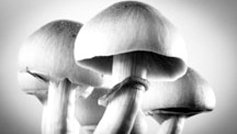Magic Mushroom Information

Magic mushrooms is the term given to mushrooms that contain psilocybin, a hallucinogenic substance. A person can eat these mushrooms, brew a tea with them, mix them with other foods or, as some people do to mask their bitter taste, coat them with chocolate and then eat them. Approximately 30 minutes after being taken, their hallucinogenic effects can start. A person’s perceptions of color, sound and light may change. Surfaces may seem to move or ripple. Moving object may seem to have visible trails that linger behind them. Along with these effects, some people also develop nausea, muscle weakness, and other physical changes. Changes in perception and thinking can last between three and eight hours.
There are hundreds of different types of mushrooms that contain psilocybin and thus exhibit these hallucinogenic properties. They grow across wide sections of Mexico, South America, Malaysia, India and Indonesia. They can also be found in the Southern US and Eastern Australia. It’s suspected that they have been used for thousands of years in religious rituals, and were definitely known to the Aztecs.
In the 1950s and 1960s, broad experimentation with this drug in the US, along with mescaline and LSD, became popular, and because of damage done to many people as a result of bad experiences (“bad trips”), all these drugs were made illegal.
Some groups refer to psilocybin-containing mushrooms as “magic” mushrooms because the hallucinations and altered perceptions may give them the impression that they have achieved some insight. Some people treating mental disorders have recently become interested in utilizing this drug in treatment. But in both of these situations, the use of a mind-altering drug for apparent personal growth carries great risk. In addition to the risk of a seriously negative experience with lasting repercussions, there are also the risks of dependence, injury and acceptance of hallucinated concepts as reality.
Development of Dependence or Other Harm

Psilocybin does create tolerance, meaning that more of the mushrooms must be used to get the same effect after awhile. Other than tolerance, the mushrooms do not appear to be physically addictive. A person can become psychologically addicted to this drug, however.
Psilocybin has mental effects that can be hard to control. In one study at Johns Hopkins University, thirty-six people used psilocybin under controlled circumstances. Eight of these people were affected by anxiety, fear or panic.
Some people may be unable to differentiate their hallucinations from reality, which can present the danger of injury or the possibility that the user will harm another.
Experimentation in Using Psilocybin for Treatment of Mental Disorders
Since 2008, a handful of researchers are testing hallucinogens for mental treatment. For example, psilocybin is being tested for treatment of depression and LSD is being tested for the treatment of alcoholism. The use of hallucinogens to help people repair mental problems is a dangerous practice.
One of the dangers comes from the message that is delivered to teens or young adults who may be looking for answers in their own lives. The use of illegal hallucinogens in treatment may be a green light for young people—or those not so young—to find illicit supplies of these drugs and see what happens.
The other danger results from the unpredictable nature of psilocybin and other hallucinogens. Relying on a drug as a short-cut to personal insight into one’s own nature, desires or problems is a dangerous habit. Hallucinations provide delusional material, especially for anyone in a vulnerable or unstable condition.
Five Decades of Service Shows that No Hallucinogens Are Needed
As far back as 1966, the Narconon drug rehab program was helping people recover their ability to live a sober, productive, enjoyable life. It’s never been necessary to administer any drugs as part of treatment. The outcome for the majority of graduates has been a competence at living sober and an understanding of the factors that led to addiction in the first place.
It’s been thoroughly proven that a person can gain insight into their own natures, problems, intentions and goals through the Narconon program. The life skills component of the Narconon rehab program offers people a chance to learn how to stably control one’s life and achieve goals of one’s own choosing.
All drugs have a toxic effect, to a greater or lesser degree. Hallucinations are unpredictable and may have after effects in the form of flashbacks, even years later. Learning to live soberly and achieve the type of life one really wants is what those at Narconon drug and alcohol rehabilitation centers around the world are occupied with. This achievement has been shown to save people from overdoses, injuries, arrests and loss.
Those who have become psychologically addicted to seeking help through magic mushrooms or any other hallucinogen can be helped by the Narconon program.
 ®
®